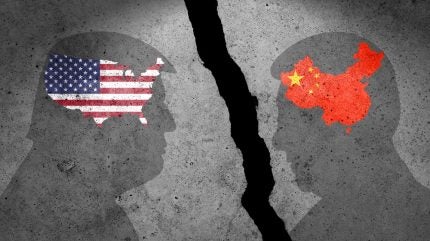Trump’s hint of reduced China tariffs sparks hope for fashion sector

TRUMP’S HINT OF REDUCED CHINA TARIFFS SPARKS HOPE FOR FASHION SECTOR
Industry
experts believe the pressures facing global fashion brands could be
"significantly eased" if US president Donald Trump follows through on
his recent suggestion that high tariffs on goods from China could "come
down substantially".
Trump made it clear the US tariffs against China, which currently sit at 145% for fashion, will not go down to zero, but it does mark the first time he has indicated a reduction could be on the horizon.
He shared the insight at a White House news
conference after US treasury secretary Scott Bessent suggested the current
tariffs were unsustainable and he expected a “de-escalation” in the trade war
between China and the US, according to news
reports.
All countries except for China currently
face a 10% base rate tariff to the US while Trump’s higher ‘reciprocal tariffs’
enjoy a 90-day tariff pause.
Once the pause ends many of the US’s
leading fashion sourcing countries will face much higher tariffs with India
facing a 26% hike in tariffs, Thailand facing 36%, Cambodia 49% and fashion
goods from Bangladesh can expect a 37% increase, amongst others.
The steep 145% tariffs on Chinese exports to
the US, which are already in operation, were introduced after China imposed a
retaliatory 125% tariff on US exports to China.
GlobalData senior apparel analyst Pippa
Stephens tells Just Style if Trump were to reduce the tariffs on China, it
would significantly ease pressures for global brands that manufacture or source
their goods there.
She adds that it would also be beneficial
for ultra-fast fashion players such as Shein and Temu that manufacture fashion
goods in China but have a large US customer base.
She explains: “As well as reducing the
urgency for brands to relocate their manufacturing and sourcing, which could be
incredibly costly, it will also mean that they will not have to increase the
prices of their products as much, aiding consumer sentiment.”
GlobalData retail analyst Neil Saunders
agrees that any de-escalation of the trade war will be widely welcomed by
apparel firms.
However, he also points out: “What’s just as
important as lower tariffs is certainty around policy.
“At the moment, the policy on tariffs seems
to shift with the sands, and it makes planning extremely difficult. Apparel
firms want a settled state so that they can take decisions around how to
structure their supply chains. Until this emerges, businesses continue to
remain nimble and look for ways to take cost out of the supply chain and shift
pricing to cover the greater expenses of doing business.”
Dr Sheng Lu, professor of fashion and
apparel studies at the University of Delaware explains that studies
consistently show China remains a critical apparel sourcing base for US fashion
companies, especially those that are small and medium-sized and have limited
resources to develop a diversified sourcing base.
He states: “The exceptionally high tariff
rate, which has exceeded 145% since April, has resulted in a de facto “embargo”
on US-China bilateral trade, hurting businesses on both sides and benefiting
nobody.
“Should the tariff rate on imports from
China be substantially cut and return to a reasonable level, it would relieve
US fashion companies and all stakeholders along the supply chain. However, it
should be noted that the uncertainty regarding the reciprocal tariffs is far
from over, and there remains a significant concern that additional tariffs
could be imposed on most US trading partners, including other critical apparel
supplying countries like Vietnam, Bangladesh, Indonesia, Cambodia, and India,
after the 90-day pause.
“Furthermore, the new de minimis rule on
imports from China, starting 2 May 2025, will also affect many e-commerce
businesses and fast fashion companies, and will be watched closely.”
Both Shein and Temu have told US consumers
that due to changes in global trade rules and tariffs, their prices
will need to go up. Irrespective of what happens with China tariffs both of
these online retailers have been hit by Trump’s closure
of the de minimis loophole, which had previously allowed goods under the
value of $800 to reach consumers duty-free.
The International Apparel Federation (IAF),
which represents global fashion manufacturers, has welcomed
Trump’s decision to pause tariffs on many fashion sourcing countries for 90
days. However, it added: “The continued application of punitive tariffs on
imports from China, one of the world’s largest apparel exporters, remains
deeply concerning and underscores the real and ongoing risk of tariff
escalation for other nations.”
By Just Style
